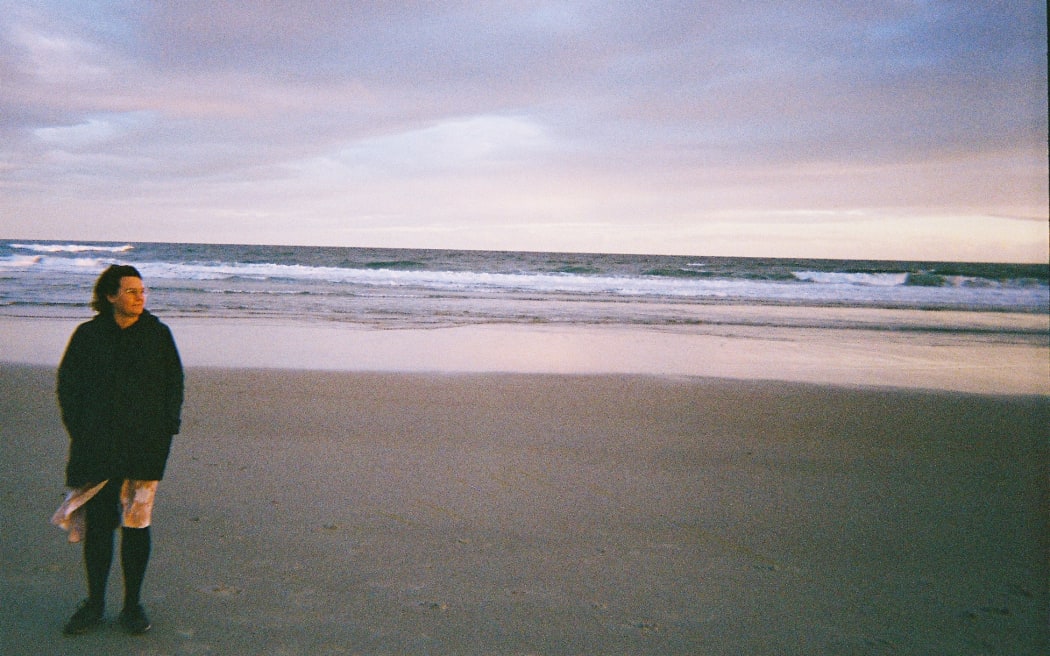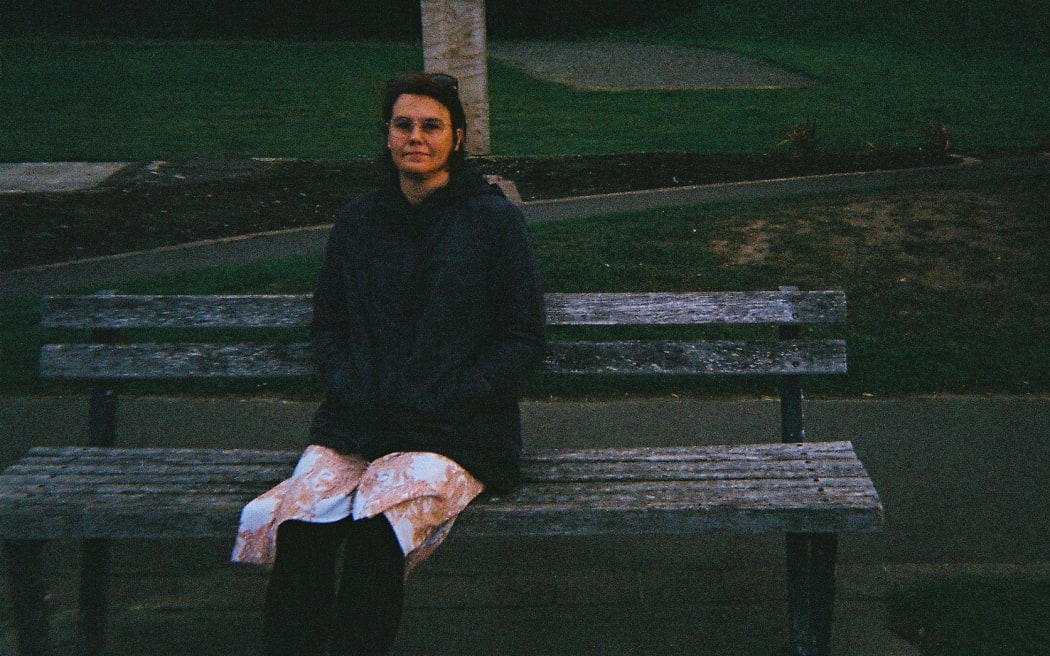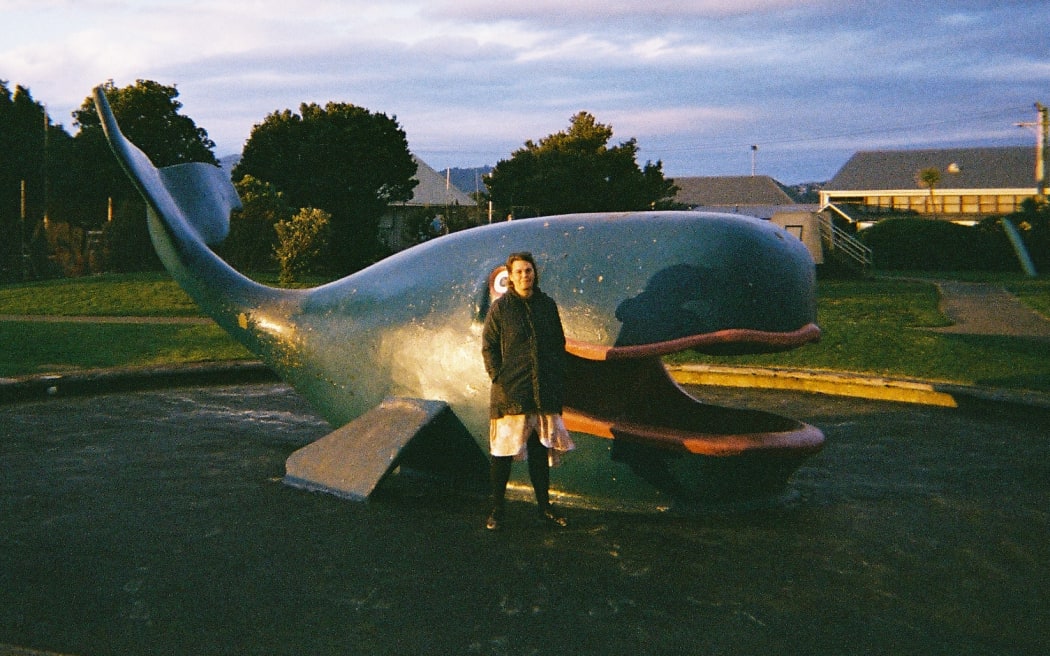
Maxine Funke on St Kilda Beach, Sth Dunedin Photo: Tony Stamp
Maxine Funke is something of an enigma. When I put that to her, as we sit in her living room in South Dunedin, she laughs. “People say that, but it’s just because I live out in the country.”
Over the past few years, she has been described as “One of Aotearoa's finest songwriters” by Undertheradar, and “New Zealand’s premier purveyor of lightness” by Folk Radio UK.
Lars Gotrich wrote for NPR: “Maxine Funke writes songs for the quiet corners of your dreams and fears”, and in Pitchfork, Allison Hussey said she “charges her songs with the energy of open air just before a heavy thunderstorm”.
When I bring up this acclaim, she’s dismissive: “The label paid for PR”.
It seems to be something she genuinely hasn’t considered, a pleasant byproduct of her compulsion to create. Across her solo output, which began with 2008’s Lace, that largely takes the form of candid, conversational folk songs, her delicate voice atop gently picked acoustic guitar.
What makes her music remarkable, aside from her command of melody and words, is the way it’s captured on tape to evoke a sense of space and time. And despite her nonchalance, a succession of international labels have commissioned her to release work: her last two records came out on Disciples, a UK-based offshoot of the influential Warp Records.
I first meet Funke in Dunedin city centre, at a small bar of her choosing. After introductions, we wander through town to escape the noise, chatting as we go. I had worried she may be reticent, given her lack of public profile, but she’s more than happy to expand on anything I bring up.
When asked about the commitments we had to schedule the interview around, she responds “Unfortunately I am a support worker. And it's really draining and underpaid. But I have a mortgage that I'm trying to pay”.
That’s not all that takes up her time: “I'm trying to get a degree in Theology, even though I'm 40”. She mentions papers on The Old Testament, Spirit, Church and Sacrament, and Pastoral Studies. When prompted on why she’s interested, she drops the kind of poetic turn of phrase that litter her songs: “It aligns with the spiritual kind of healing I get from music.”
Does work and study leave much time to create music? “No, it's really difficult. I'm always trying to adapt to whatever situation I'm in. And it's always really difficult. But music is really important.”

Maxine Funke Photo: Tony Stamp
Her musical output began in the 1990s, when she was still a teenager, playing with her step-father in The Snares. She sang and played guitar in a much louder way back then, worlds away from her solo output. This led to a collaboration with experimental musician Alistair Gailbraith called $100 Band.
She and Gailbraith have a son. He plays piano, but is less musically-inclined than his parents: “He's got a really different type of brain to me. He loves playing chess. He's hired an Armenian chess coach online.”
Funke suggests we sit outside a nearby church. I ask about her formative years in Dunedin, a city she describes as being “really dark” in the 1990s, and our conversation grows more rueful.
“I was pregnant when I was 19,” she says. “I shouldn't have been at pubs, I shouldn't have been out with my parents in those sorts of places when I was just a kid. But that was the world that I was in.”
She speaks regretfully about not getting to know her father before he died suddenly of a heart attack. It was around then that she met Gailbraith, saying that at the time, he felt like “the answer to [her] problems”.
“It wasn't a healthy relationship,” she says, alleging that when Gailbraith “inherited a lot of money, he just kind of disappeared.”
Our time is slipping away (Funke has an online lecture to attend later). As I’d expressed an interest in checking out her recording setup, we make the drive back to her flat in the suburb of St Kilda.
Various rooms house her collection of microphones, a reel-to-reel tape machine (tucked behind the couch), and the acoustic guitar that appears on all her albums. Her deal with Disciples helped pay for a few new keyboards/ sound sources, and a Røde microphone.
She tells me she works to distinguish each song on her albums, giving them different textures according to the analogue or digital device she records on. She also plays cello, and increasingly uses field recordings captured around Dunedin. The way she talks about these more avant-garde pieces is indistinguishable from her more traditional singer-songwriter output.
“It's more than the music,” she says, “It's the experience. It's just a really reflective time. And it's great to be in another space. Lost in another world.”

Maxine Funke at a park in Sth Dunedin Photo: Tony Stamp
I ask if she ever plays live, and she quickly replies “I can’t really be bothered”. I say she doesn’t seem fond of self-promotion at all, to which she responds, gently, “The reality is that being a working class person in a cost of living crisis is a massive factor. I don't have any hope that the financial gains would sustain me. I mean, the last interview I did, the photographer got paid. But me, I don't always get paid.”
She’s also an inherently shy person, which played a part in her musical trajectory. I bring up how different her solo output is to those earlier bands, and she explains, “I just wanted to get away from being in pubs. I found being on stage really overwhelming and really stressful. I felt like I wanted to [play live], but I couldn't.
“I commend rock musicians. It's a working class ethic, to go through the same songs, night after night. It’s hard work. I'm not cut out for that.
It was when Alistair Gailbraith offered to record some of her solo songs that her outlook changed. “I heard the songs in a way that I hadn't really heard myself. I liked the potential.”
Funke grew up on Waiheke Island, with a mother and step-father who “really wanted [her] to be famous”. Her mum was her manager, getting her cast in TV commercials as a kid. They moved to Dunedin when Maxine was eight, and at her parent’s insistence, she and her sister began busking on the main street of South Dunedin.
“We used to play folk songs”, she says, explaining that, years later when she began working on her own material, “It wasn't a foreign thing to just get on with it, and enjoy it, and press record.”
That led to six albums, as well as a few singles and EPs, released on labels in America, Sweden, and Britain. Other opportunities followed: she was approached to play Auckland's Others Way festival, but pulled out when told she wouldn’t be able to sound check.
And at 5am one morning, when she was working at a Countdown supermarket, polishing the floor, she received a message on Instagram from James Krivchenia, who plays drums in acclaimed American band Big Thief. He asked her to open for them at their Auckland show.
“It was a gift out of the blue”, she says, “It was so fun”.

Maxine Funke performing at the Powerstation, in support of Big Thief Photo: Ivan Karczewski, Ambient Light Blog
At that gig she performed on keyboard. In recent years she’s had to forgo guitar entirely, due to an RSI injury in her shoulder. True to form, she seems unfazed by this, happy to simply switch instruments. “Most of the power comes from the melody and words, anyway.
“It was quite freeing. I don't feel like there was much more for me on the guitar anyway, looking back on it. [Keyboards are] just another world to explore.”
She’s pragmatic, but also a firm believer in the power of music, regardless of form.
“There’s a sort of freedom that you get from it. And you get in touch with a certain state of mind, which is great fun to be in. I wish we could all be in that place.
“It is hard work to get things to the sort of level that I find really satisfying. It's tiring, finding the space, and battling the forces of the universe to try and make that space. But nothing else really compares to it.
“And maybe there's something in it that is hopefully transported [to the listener]. People do get in touch through Instagram and say ‘Oh, that's great’. And I love that. People on the other side of the world feeling motivated to get in touch, it just seems like magic, doesn't it?”

